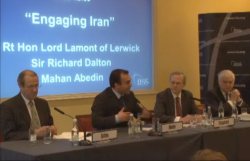ID :
215329
Wed, 11/16/2011 - 12:46
Auther :
Shortlink :
https://www.oananews.org//node/215329
The shortlink copeid
New Approach Needed Towards Iran, says UK Lord

London, Nov 16, IRNA – Former British chancellor of the Exchequer Lord Lamont has called for the West to adapt a new approach towards Iran to resolve the dispute over the country's civilian nuclear program.
“Economic sanctions imposed upon Iran to stop or slow its nuclear program would never achieve their political objective,” Lamont warned.
“They had rarely, if ever, done so – in fact, in Cuba, the regime would have fallen long ago if there had not been a sanctions regime,” he said.
Lamont, who now chairs the British-Iranian Chamber of Commerce, warned that sanctions did have an effect on economic activity by hindering ordinary private business.
Speaking at a seminar on Engaging Iran, he suggested a new approach was needed that should include incentives and should also take into consideration Iran's security concerns.
The Conservative peer also criticised the West's contrasting relations with Saudi Arabia in comparison with Iran, which he said was “loop-sided.”
Saudi Arabia was depicted as a so-called moderate country only because it was a Western ally, he told the seminar organised by the International Institute for Strategic Studies (IISS) in London.
The conference was examining possible routes forward in the confrontation over Iran’s nuclear program, with the two other speakers, former British ambassador to Tehran, Sir Richard Dalton and journalist Mahan Abedin, who also disagreed with the West's approach.
Dalton said there was a large lack of mutual confidence in the current stand-off, in which the West’s approach was being driven by short-term political considerations and the entire negotiation effort on both sides was taking place on ‘very narrow tramlines’.
But he believed it was still possible to negotiate an arrangement that left both the United States and Iran satisfied, while strengthening the non-proliferation regime.
Such a deal would involve acceptance of Iran’s nuclear program within operational limits, with export of enriched uranium and, later, imports of materials to be allowed when Iran had a genuine need for them for its civil nuclear energy industry, the former envoy suggested.
He said an arrangement would involve a proper accounting for the enriching of uranium as well as embracing regional issues including Lebanon, Middle East peace and the concerns of Arab state in the Persian Gulf.
Abedin, who specialises in Iranian affairs, looked at the issue from the perspective of Iran's military doctrine, which he said did not include nuclear weapons.
Iran’s military stance was purely a defensive and strategically was conditioned heavily by past wars and apprehension about future conflict with the United States, he said.
The journalist argued that Iran’s defence posture did not imply actual possession of nuclear weapons, rather it was a policy of ‘latency’ – to only acquire the knowledge but not to develop nuclear weapons./end





